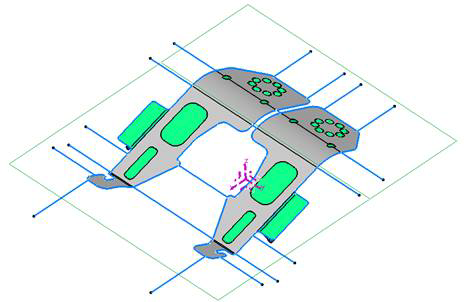-
From the
Method Planning section of the
action bar,
click
Trim Partition
 .
.
-
Select the elements to split:
- A surface. The boundary of the surface is computed. Each domain
of the boundary is added as a geometrical result. The bigger loop
(usually the outside boundary) is the Cutting
Line. Others are typed as Positioning
Holes.
- A stamping direction. The boundary of the shape that is the
input of the stamping direction is considered. For each part of this
boundary associated to a tool direction, cutting lines are computed for
the external boundary and positioning holes for the other edges. Cutting
lines and positioning holes are computed for the other parts, the same
way.
- A surface partition. An inner join is computed with all the
partition elements, using the associated unfolded view of each
Folded Surface geometrical result, if any.
Then, the computation is the same as for a surface.
-
Select the splitting elements to divide the boundary into several areas, all
kept.
- 3D curves. They cut the surface boundary directly.
- Sketches. An internal extrude of the sketch is computed, in the
plane direction. Its intersection with the surface boundary is used to
cut the boundary.
- A plane and create a sketch on the selected plane from the context toolbar.
Trim Partition trims the elements that cut the
part boundary at the intersection with the boundary. Only their longest part is
kept.
- The trim elements trim each domain of the input wireframe, and keep the side with the
most intersections, or the longest side.
- The result of the trim is a Scrap Cutter.
The partition of the boundary is created. Each part of the boundary is
kept, ensuring the whole part is cut by all the cutting elements.
-
Select the elements (wireframe) to cut the scraps.
Depending on the geometries inside the sketch that defines the scrap cutters,
geometries are extracted and computed with a type (Scrap hole or Scrap Line).
Note:
Existing older trim partitions are updated to create scrap
cutters types.
-
Check the result under
More.
-
Select one element.
- Optional:
Change its type from the
context toolbar.
-
Edit the minimum and maximum tolerances of the curves as
required.
For more information, see
General Preferences.
-
Choose intermediate geometries to associate to the selected
element.
The table of results is updated.
A Partition Set is created such as the blue
lines and blue boundaries of green holes below

Result
areas are stored under geometrical sets:
- Planned Elements (Associated to a process action)
- Not Planned Elements (Not associated to any process
action)
- Ignored Elements (Not used by the process).
as
- Positioning Hole
- Painting Hole
- Cutting Line
- Intermediate - name.
